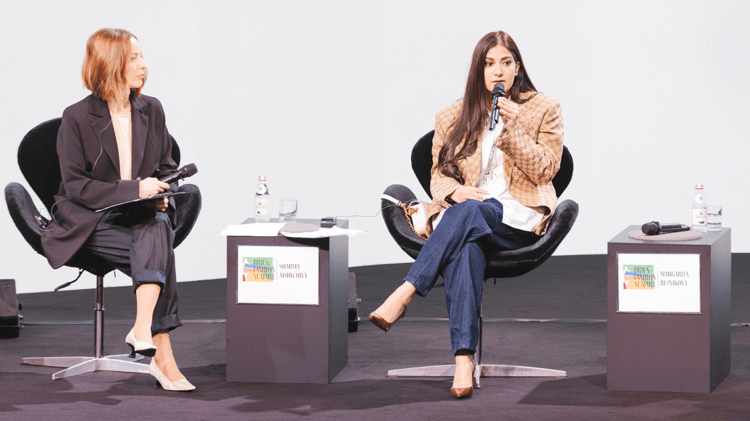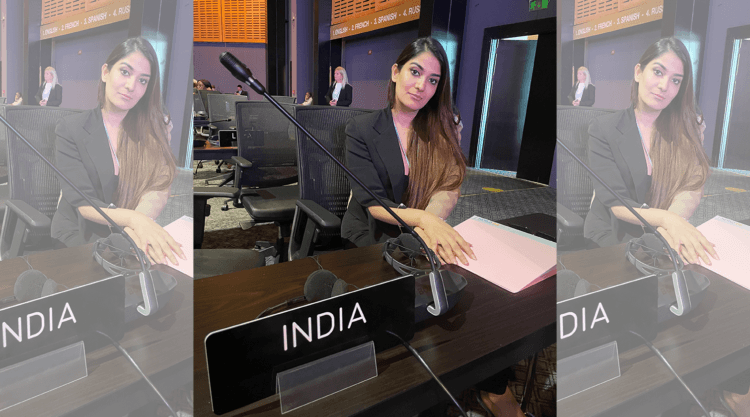
If you educate a
woman, you educate
the whole family
PUMA Voice of a RE:GENERATION Aishwarya Sharma on Climate Justice and Women’s Empowerment
March 27, 2024PUMA Voice of a RE:GENERATION Aishwarya Sharma on Climate Justice and Women’s Empowerment
March 27, 2024“The climate crisis is not gender neutral”, Aishwarya Sharma, one of PUMA’s Voices of RE:GENERATION tells CATch Up. As an Indian sustainable fashion advocate, Aishwarya champions gender equality alongside other critical sustainability topics.
Have you ever considered how climate justice and women’s empowerment intersect? CATch Up had the privilege of discussing this with Aishwarya. Read on to explore how these two vital topics intertwine and what they mean for women worldwide.
Can you give us an overview of the importance of climate justice and its direct impact on women?
Aishwarya: The climate crisis is not gender neutral. Women and girls experience greater threats from climate change. This further intensifies the existing inequalities and poses unique threats to their livelihoods, health, and safety. Across the world, women depend more on, yet have less access to, natural resources. Increased climate calamities affect women in remote regions, tribal communities, and minority groups the most.
The climate crisis is not a future threat but a present reality. While scientists could provide us with facts that give a timeline to hopefully reverse the damage, for most communities this damage has already happened and most of those communities are in fact women and children.
Women, who make up the majority of the developing world’s 1.4 billion poor, generally have lower incomes, less access to credit and decision-making authority, and limited control over resources. This further increases their vulnerability to many climate impacts. The Tata-Cornell Institute for Agriculture and Nutrition reports that 8 out of 10 women in India are responsible for collecting water for their households, 1 in 10 people in India do not have access to safe drinking water source.
From your point of view, what is the status of women in the sustainability industry, are they represented?
Aishwarya: Women have been making significant contributions to sustainability across various sectors, including renewable energy, environmental conservation, sustainable development, and corporate responsibility. However, challenges such as gender gaps in leadership roles, wage disparities, and underrepresentation in certain technical fields are still plenty.
The role of women in sustainable development is multidimensional and their voices need to be included at every forefront. Women are not only vulnerable to climate change, but they are also effective actors or agents of change in relation to both mitigation and adaptation. This mindset will dramatically shift the discourse towards creating more spaces for women within the sustainability framework and to have their voices heard and implemented.
How can women use their strengths to drive change?
Aishwarya: Women are typically the first responders to their families, have unique ideas and perspectives, and often drive change at various levels. Not only are they the primary caregivers and the managers of natural resources, including food, shelter, and consumption of goods, in most cultures, many women, in fact, also have jobs and have careers in the formal economy. Women’s responsibilities place them in a unique position to improve the human and economic well-being and to conserve and maintain the natural environment.
Diversity in leadership can facilitate better decision-making. Women leaders are more likely to invest in renewable energy, leading to reduced greenhouse-gas emissions and improved environmental outcomes, and women-owned businesses are more likely to pursue greater energy efficiency and practices such as recycling.
What tips do you have for individuals who want to be more active in sustainability?
Aishwarya: Sustainability can be different for everyone, whether that means switching to greener choices in food, reducing water usage, or buying products that have less impact on the environment. Even a small step is a good step.
What motivates you to keep working in such a challenging field?
Aishwarya: Changing weather patterns like the aggressive heat in Delhi or longer summers are constant reminders of how inhabitable cities are becoming, especially in the Global South. Natural resources are depleting rapidly with little to no hope of preservation if no tangible and immediate action is taken. Today, global warming is not just a textbook topic but a harsh reality. It’s becoming unbearable every day and as a sustainability and climate advocate with people looking up to me, it’s imperative I lead by example.
Do you have a role model and how do you try to be a role model for others?
Aishwarya: Many. I love Amal Clooney, her efforts to uplift human rights have been monumental in shaping freedom of speech worldwide. It’s really about putting people over profit. There are a number of social activists and climate movements that have inspired and shaped my own journey in fashion activism and its integration with climate justice. I have successfully managed to create fashion activism in parallel to the existing Indian fashion industry in the hopes of creating a better world. I feel grateful that there is such a growing interest and curiosity amongst people.

